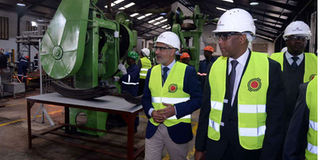Unchecked imports a threat to Big Four dream: Manufacturers

Auto Springs East Africa CEO Salil Patel (left) and Industrialisation Cabinet Secretary Adan Mohamed during the opening of the factory in Limuru. The factory manufactures a wide range of products for vehicles. PHOTO | FILE | NMG
What you need to know:
- The Kenya Association of Manufacturers (KAM) said this year portends a gloomy period for them since major consignments for big ticket projects funded by the State worth billions of shillings were being awarded to foreigners.
- In a statement, KAM’s chief executive Phyllis Wakiaga said government departments spending billions of shillings to procure finished goods and services from foreign companies were busy exporting jobs and the much-needed revenue.
- Speaking after the government paid a South African firm Sh500 million for the supply of 50 high capacity buses, Ms Wakiaga said the government’s Medium Term Plan enabling manufacturers to increase their Gross Domestic Product contribution from 8.3 to 15 per cent by 2022 was being derailed.
Manufacturers have accused senior government officials of frustrating the sale of locally produced goods by allowing direct sourcing of the same from overseas.
The Kenya Association of Manufacturers (KAM) said this year portends a gloomy period for them since major consignments for big ticket projects funded by the State worth billions of shillings were being awarded to foreigners.
In a statement, KAM’s chief executive Phyllis Wakiaga said government departments spending billions of shillings to procure finished goods and services from foreign companies were busy exporting jobs and the much-needed revenue.
“The government is the biggest customer for any business and its contribution to our growth cannot be understated. If we are to realise 35 per cent growth every year, the government must adhere to laid down policy that requires up to 40 per cent of orders for goods and services be sourced locally,” said Ms Wakiaga.
ALSO READ: State orders SA buses as Dar buys in Kenya
She added: “The Buy Kenya, Build Kenya policy was aimed at creating demand for our goods and services that would see us employ more people and expand our facilities, hence higher earnings for employers and employees.”
Speaking after the government paid a South African firm Sh500 million for the supply of 50 high capacity buses, Ms Wakiaga said the government’s Medium Term Plan enabling manufacturers to increase their Gross Domestic Product contribution from 8.3 to 15 per cent by 2022 was being derailed.
Ms Wakiaga said there is need for the creation of a National Automotive Council to oversee the projects since government agencies seem inclined to singlehandedly source for goods and services abroad.
“The manufacturing sector contributes only 8.3 per cent to the GDP and growing at annual rate of 2.3 per cent. Favouring imports over local content, say, surpassing our local bus body builders and assemblers, does not at all sync with the agenda to boost the sector’s ability to provide employment locally,” she said.
Similar sentiments have been raised by other professional entities that feel government officials have ignored local experts and local manufacturers in procuring various goods and services towards realisation of President Uhuru Kenyatta’s Big Four development agenda.
Under President Kenyatta’s plan, food security, affordable housing, universal healthcare and manufacturing are to receive 100 per cent support from government agencies as well as policies as a way of improving livelihoods.
“If we are to realise the desired goals in the Big Four Agenda then it has to be demonstrated through commitment to the 40 per cent local content procurement regulation especially in critical infrastructural projects and decisions. This will encourage further investments in Kenya by local and foreign investors, increasing government revenue and, more importantly, offering productive jobs,” said Ms Wakiaga.
Architects and quantity surveyors have cried foul over respective government agencies’ preference for foreign professionals that has sharply reduced their role to spectators.
“We are wasting resources on costly foreign sourcing of professionals since small Kenyan firms have the required skills but lack financial muscle to implement multi-billion shilling projects. Enable them (SMEs) to grow their experience by allocating them big ticket projects,” said newly elected Institute of Quantity Surveyors of Kenya chairman Peter Kariuki.
On its part, the Association of Retirement Benefits Schemes (ARBS) urged the government to provide all details for the planned mass housing developments to enable their members decide the way forward.
ARBS council chairman Simon Nyakundi said government officials had been holding numerous meetings with foreign investors and mass housing units developers as well as building materials’ manufacturers but is yet to provide details of the impending projects.
“We are willing to participate in these projects that improve housing for our people but must be told in black and white what is in store for us. No details have been forthcoming and we have requested for the same to enable us to brief our members during the upcoming annual general meeting next month,” said Mr Nyakundi.
ARBS members control about Sh1 trillion where about Sh200 billion (20 per cent) has been invested in real estate ventures, with the rest largely held in securities, bonds and land among others.
According to Mr Nyakundi, private sector contribution to the Big Four could best be achieved if the government convened a national conference to discuss the way forward.
“What we need is a local solution to our local problems. Only when Kenyans own the change process where their businesses benefit from the Big Four agenda will it succeed,” said Mr Kariuki.




